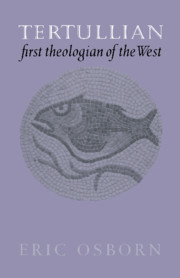Book contents
- Frontmatter
- Contents
- Preface
- Note on the text and list of abbreviations
- 1 Simplicity and perfection
- 2 The puzzle: Athens and Jerusalem
- 3 The paradox: credible because inept
- 4 Strife of opposites and faith as recognition
- 5 Antithesis in one God: ‘Against Marcion’
- 6 Trinity and christology
- 7 Prayer and the bible
- 8 Mankind's two natures and a sordid church
- 9 Argument and humour: Hermogenes and the Valentinians
- 10 Promise of laughter, judgement of hell: apocalyse and system
- 11 Ethics of conflict
- Conclusion
- Select bibliography
- Subject index
- Citations from Tertullian
- Citations from the Bible
10 - Promise of laughter, judgement of hell: apocalyse and system
Published online by Cambridge University Press: 09 November 2009
- Frontmatter
- Contents
- Preface
- Note on the text and list of abbreviations
- 1 Simplicity and perfection
- 2 The puzzle: Athens and Jerusalem
- 3 The paradox: credible because inept
- 4 Strife of opposites and faith as recognition
- 5 Antithesis in one God: ‘Against Marcion’
- 6 Trinity and christology
- 7 Prayer and the bible
- 8 Mankind's two natures and a sordid church
- 9 Argument and humour: Hermogenes and the Valentinians
- 10 Promise of laughter, judgement of hell: apocalyse and system
- 11 Ethics of conflict
- Conclusion
- Select bibliography
- Subject index
- Citations from Tertullian
- Citations from the Bible
Summary
MONTANISM
The New Prophecy emerged in Asia Minor in 157 or perhaps as late as 172. Our chief accounts of the movement derive from fourth-century sources (Eusebius and Epiphanius) which are marked by later orthodoxy. Earlier in the second century, Papias (130) preached a colourful chiliasm and Christian Asia Minor was strong in prophetic tradition and practice. According to Eusebius, Montanus was only a recent convert, when, in a village of Phrygian Mysia, he was seized with ecstasy and prophesied strange things which were not consistent with the tradition of the church. Some rejected him as a false prophet, but others were aroused and turned from the true faith. Two prophetesses joined him in enthusiastic frenzy and their influence spread, until, says Eusebius, their sayings were examined and they were expelled from the church.
According to a source in Epiphanius, the Montanists accepted what became the two testaments of the Christian bible, a trinitarian faith and the new prophecies of Montanus, Priscilla and Maximilla, with the requirement that others must exhibit the same spiritual gifts (Pan. 48.1.4). Yet Maximilla claimed inconsistently that after her there would be no more prophecy and that the end would come (Pan. 48.2.4). The oracles attributed to Montanus (Pan. 48.4, 10, 11) professed the passivity of a lyre under a divine plectrum, claimed to be God almighty in human form and pointed to new heights of spiritual excellence when even the little ones would shine brighter than the moon.
- Type
- Chapter
- Information
- Tertullian, First Theologian of the West , pp. 209 - 224Publisher: Cambridge University PressPrint publication year: 1997



